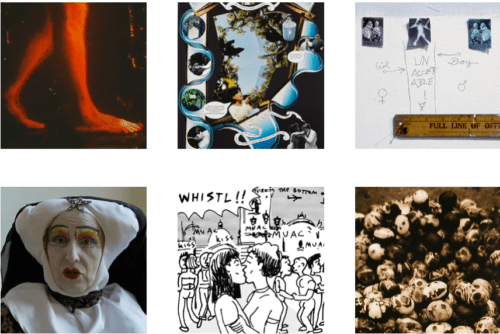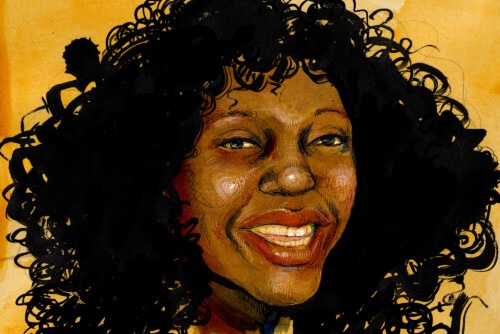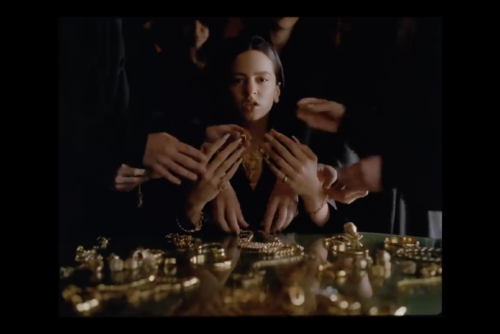Linguistic Shuffling: The Thug and the Cleric
One significant aspect of the film is how Reza Marmoulak’s regularly switches and combines linguistic registers. The film not only demonstrates the dependency of the visible on speech, in Rancière’s terms 1, but also turns speech into the visible by exposing the speech act as a site of political and cultural regulation. The comedy genre enables the comingling of the vulgar and sexualized language of the hyper-masculine thug with the linguistic norms of respectability (depicted as specific to the hegemonic masculinity of citizens) in Iran. The use of two linguistic forms in one hybrid sentence connects class codes and the presence of a veiled language for men within the continuum of modern patriarchal respectability. The possibility of using language as both revealed and hidden, and the audience’s participation in filling in the blanks of the vulgar and abjectified language of the thug, expose the playful and light aspect of the kooche va bazaar language and unmask the gendered and classed nature of linguistic competency and its boundaries. In many instances in the film, Reza starts a sentence in a vulgar language—a sexually explicit speech that crosses the boundaries of male honor and modesty—but turns it immediately into a normative one, suppressing specifically sexual connotations. For example, in his interactions with the young woman he alters his flirtatious words into a modest language. Or he starts saying the “F word” but changes it into a greeting. This linguistic strategy not only reveals the boundaries of certain forms of masculinity and its connection to both sexuality and violence, but also exposes the normative convergence of religion, gender, and class in producing a disciplined and respectable masculinity within language. The concomittent presence of a vulgar but sexually charged language and a respectable and modest language conceals and reveals modern investment of patriarchy in regulating sexuality.
While normative language, or, in this case, a few meaningful phrases that Reza has learned through his encounter with the clergyman, enables him to give his public sermons at the mosque by simply repeating and expanding on a few significant statements, including the phrase borrowed from Le Petit Prince, Reza also exposes language as a kind of symbolic capital through which one can exercise power over others. In this context, the class privileges of those with a religious or secular education are exposed. Here religious education is depicted as symbolic capital rather than a set of beliefs, the closest thing to a modern education that is denied to the lower classes. 2
While religious and secular education is the clergyman’s symbolic capital, popular culture and kooche va bazaar is where Reza Marmoulak and masses of lower-class Iranians get their inspiration. We see this played out in an important sequence of the film in which Reza Marmoulak is eating dinner with a group of people after giving his sermon at the mosque. There he allows a young man to sing a popular Turkish love song in the mosque and he uses the concept of “tilawat” that is used for the recitation Qur’an to allow the singing of the popular song.
So there is no dust when the savior [my lover] comes
So he/she comes and goes in such a way 3
That realizing his/her presence needs no words
He/she has left and I am left alone
He/she whose beauty is unmatched
I have lit the samovar and
Added sugar cubes to my tea
And I am waiting
I am waiting
I am waiting
The group of men is both surprised and pleased that the clergyman gave the young man permission to sing this well-known Turkish love song. In this scene, we see the space of the mosque and the space of kooche va bazaar converge to create a place for both religious prayers and popular songs. Sara Ahmed argues that, “passing as phantasy of becoming the other involves an apparatus of knowledge that masters the other by taking its place.” 4 The apparatus of knowledge in this case includes secular and religious education for Reza the clergyman and popular culture for Reza Marmoulak. In one of the last scenes, Marmoulak’s access to the podium when he is invited to give a sermon for male prisoners enables him to articulate his ideas vis-à-vis the contradictions of a modern nation-state that combines modern disciplinary technologies, including the prison industrial complex, with religious discourse to punish its most vulnerable citizens.
After the establishment of the Islamic Republic, Iranian popular culture was suppressed and replaced by Islamic values. A number of well-liked entertainers, including dancers, singers, and musicians, were forced to either give up their careers or leave the country for diasporic cosmopolitan cities in North America or Europe, especially Los Angeles. In Iran, the battle over the space of popular culture continues to be at the center of cultural and political negotiations, especially for women entertainers who have been banned from public singing and dancing (except performing for a women-only audience). While after the Islamic Cultural Revolution, film, television, and theater have become legitimate and respectable spaces for women as performers, actresses, and directors, the struggle over popular culture and what is permitted or prohibited continues. With the massive investment of young Iranians in cyber culture, including email, blogging, and Facebook, the struggle over popular culture has been extended to include new spaces of political and cultural citizenship. 5
- Rancière, 2007, 113.[↑]
- Indeed, going to religious school has been a way for the rural and lower classes to get a free education.[↑]
- Var could be either feminine or masculine but in the subtitles this has been translated as “he.”[↑]
- Ahmed, 1999, 99.[↑]
- For a recent study of the internet in Iran sees Bolgistan by Sreberny and Khiabany, 2010. For a detailed study of Iranian bloggers see Sima Shakhsari, Blogging, Belonging, and Becoming. Cybergovernmentality and the Production of Gendered and Sexed Diasporic Subjects in Weblogistan, PhD Dissertation, Department of Anthropology, Stanford University, 2010. [↑]



